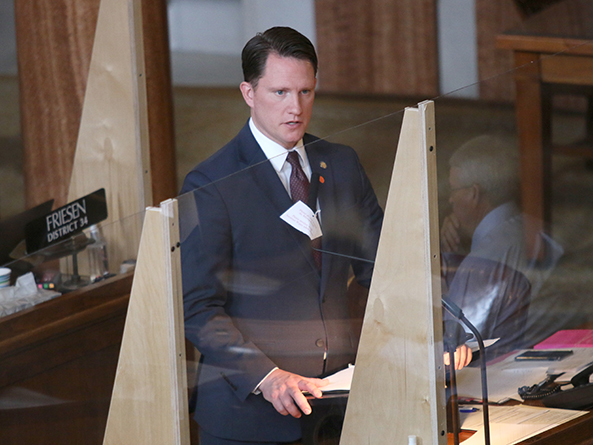Session Review: Business and Labor
Among the issues considered by members of the Business and Labor Committee this session were compensation for families of first responders, strengthening worker protections and expanding unemployment benefits and family leave.
LB255, introduced by Lincoln Sen. Matt Hansen, provides monetary compensation to the family of a law enforcement officer, firefighter, correctional officer or government or nonprofit EMS ambulance squad member killed in the line of duty, including those who work on a voluntary basis.
Under the bill, a qualifying family member must file for compensation within one year of the death. For first responders killed in 2022, compensation provided will be $50,000. For each following year, compensation will be equal to the previous year’s compensation increased by the percentage increase in the consumer price index for all urban consumers.
The bill defines a line-of-duty death as having occurred within three years of a related incident or injury during the active performance of an individual’s official duties.
LB255 passed on a 38-6 vote.
Worker protections and wages
A bill to extend employment discrimination protections was approved by lawmakers this session.
LB451, sponsored by Omaha Sen. Terrell McKinney, expands the definition of race in the Nebraska Fair Employment Practice Act to include characteristics associated with race such as skin color, hair texture and protective hairstyles. The bill defines protective hairstyles as braids, locks and twists.
An employer still may implement health and safety standards regulating characteristics associated with race as long as they are non-discriminatory and applied equally to all employees, and if good faith efforts have been made to accommodate an employee.
The Nebraska National Guard and state, county and local law enforcement agencies may continue to impose their own dress and grooming standards.
LB451 passed on a 40-4 vote.
A bill intended to protect meatpacking employees from the coronavirus pandemic stalled on select file.
Omaha Sen. Tony Vargas introduced LB241, which would require meat processing employers to maintain 6 feet of space around and between each worker, including in common areas like lunch, break and locker rooms.
Among other provisions, employees would be screened for COVID-19 at the start of each shift and could leave the meatpacking operation premises to receive a test on paid work time.
The bill also would ensure paid sick leave for an employee who tests positive, which would not count against any other paid sick leave owed to the employee. The protections proposed in LB241 would apply until June 30, 2022.
Kearney Sen. John Lowe offered a motion during select file debate, adopted 25-18, to bracket the bill until June 10, 2021, which ended consideration of LB241 for this session.
Unemployment and family leave
In light of the coronavirus pandemic, lawmakers voted this session to expand eligibility for unemployment benefits.
LB260, sponsored by Omaha Sen. Megan Hunt, expands the list of “good cause” reasons to leave employment voluntarily to include caring for a family member with a serious health condition.
The bill allows workers to be eligible for unemployment benefits if they voluntarily leave employment to care for a family member but are seeking to return to employment and meet all other existing requirements.
LB260 passed on a 33-11 vote.
Lawmakers debated two additional bills that would expand unemployment eligibility and paid leave in Nebraska.
Omaha Sen. Mike McDonnell sponsored LB298, which would allow work-authorized immigrants to collect unemployment benefits when otherwise qualified. Currently, Nebraska employers pay unemployment insurance taxes for these employees, who are barred under state law from receiving such benefits.
An individual eligible for benefits under LB298 first would have their employment authorization verified through the federal Systematic Alien Verification for Entitlements Program.
The bill advanced from general file on a 26-9 vote but was not scheduled for select file debate this session.
LB258, sponsored by Vargas, would require employers with four or more employees to provide paid sick and safe leave. Under the proposal, employees would accrue at least one hour of paid leave for every 30 hours worked. Employees could earn up to 40 hours of paid leave per year, based on hours worked.
Qualifying employers would be required to allow an employee to use his or her paid sick and safe leave for a mental or physical illness, injury or health condition, to care for an ill family member or for an absence due to domestic abuse, assault or stalking — including psychological treatment or legal services.
LB258 failed to advance from general file on a 17-20 vote. Twenty-five votes were needed.


